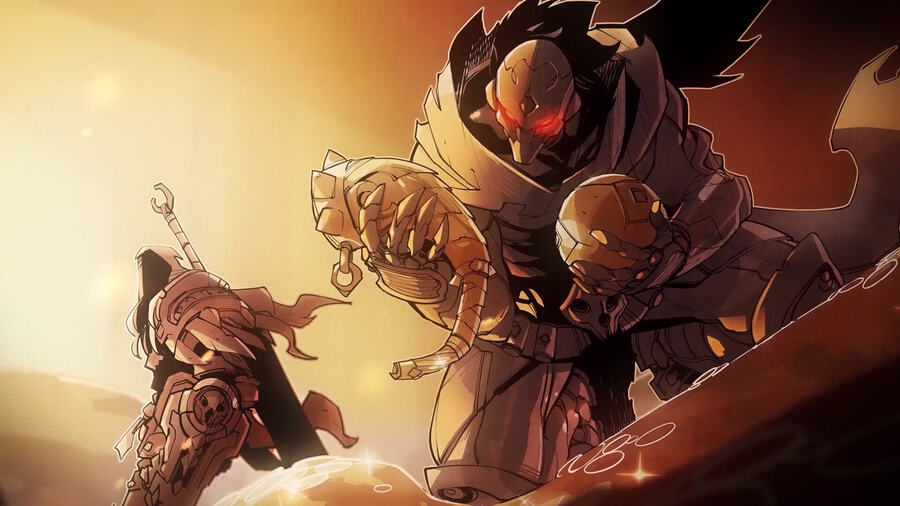
Up next in our ongoing series of composer interviews, composer Gareth Coker stops to chat with us about one of his newest projects, the score for the latest Darksiders title, Genesis. We talk about getting the tone of the game just right while doing something new, how demonic dubstep found its way into the series, and what on earth a fujara is and why it featured in the game.
Push Square: In what ways did you set out to differentiate the sound of this newest title from its forebears, and by that same token, what ways did you want to be subservient to what had come before? What was that balancing act like?
Gareth Coker: I think I had somewhat of an advantage here, as the first thing that I noticed was the perspective of the gameplay had changed quite drastically from the prior entries in the series. The different style, look and feel allowed me to really try and push the envelope for this game’s music. Airship Syndicate basically said nothing was off the table; it was just a case of “make something for us, and we’ll tell you if we like it and if it fits.”

The only thing that I was really told to avoid was ‘too much’ orchestra, to not have an overreliance on it. That’s not to say not to include it, but it meant that aesthetically, I referenced the score for Darksiders II the most.
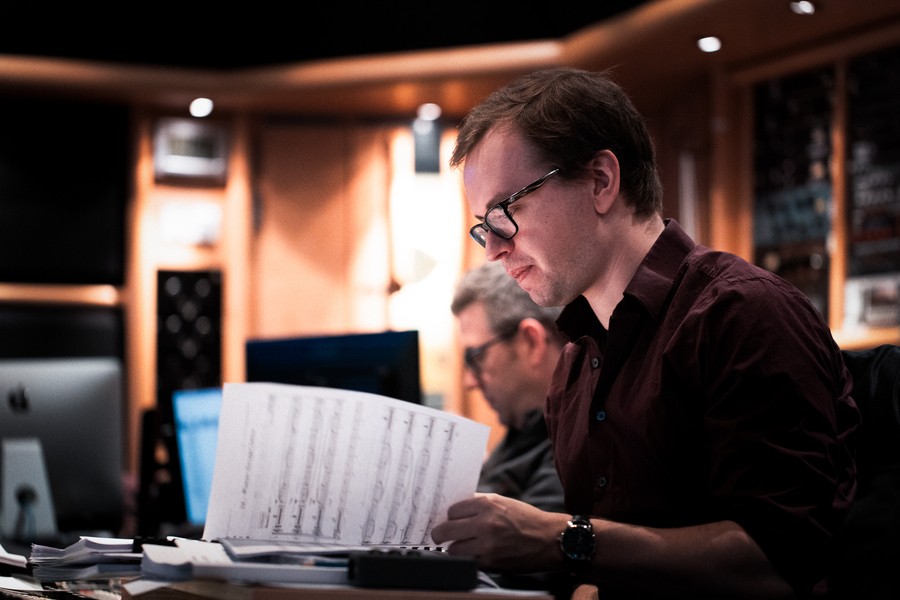
With the above in mind, the first thing I did was write a concept suite. Nothing that would really end up in the final game, but more an idea of what I envisioned the soundtrack to be like. The track ended up being a pretty big exploration at 9 minutes long, through many genres and Airship Syndicate basically just said ‘yes, more of this, and especially more solo strings.’ From this concept track the main violin riff you hear in the main theme, final boss theme, and trailers was born, as well as some of the electronic sounds, and the Bulgarian voices.
Across your career, you’ve dabbled with some wildly different sounds, ranging from the emotional wallop of the Ori titles and the cyberpunk-esque music for The Unspoken (a personal favorite) to the more action-packed score for Ark. In what days did the sound you wanted to capture for Genesis differ? Were there any areas it was surprisingly similar?
Creating the palette and defining the feel is the most enjoyable part of the job for me as you’re establishing the sound of the game. This soundtrack in particular really had a little bit of everything. If we were to combine a couple of the titles above though it would be ARK and Unspoken. Darksiders Genesis is an action game first and foremost, so when looking at the games you’ve referenced, it made sense to use The Unspoken as a reference for establishing the sound especially from the electronic side, while the scope of ARK and its use of orchestra was looked at.
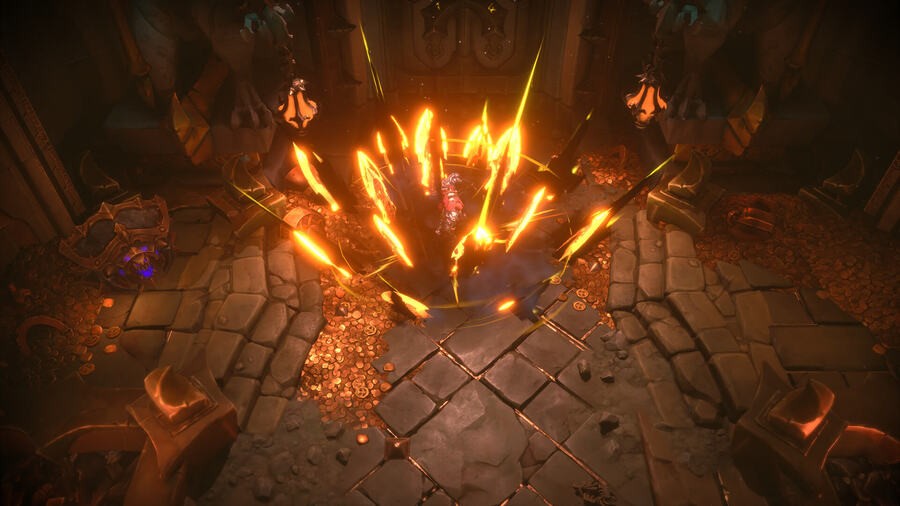
The most important thing was to capture the spirit of the game. This is a very difficult process to put into words, but like many of the projects I work on, I was given extensive access to the game while in development. Being able to play it helped me get in sync with the game, and give it what I thought it needed. I think one thing I wanted to make sure was the music, while sounding epic, also needed to be fun to listen to, as opposed to just existing and serving a function. There is so much action, and the game’s action is highly based on flow. The flow is to keep moving, keep shooting, and... kill more demons. The music had to have a sense of drive and purpose; Strife and War are not messing around in this game!
Is there any element to your score that might easily be missed whilst playing that you’re especially proud of? Want to bring some attention to it now? Maybe a leitmotif that could easily be missed in the moment, or an unexpected instrument or melody?
The woodwind instruments that are used in this game are rarely featured up-front in the mix but often used. They often act as flourishes between sections in the piece of music, or as stingers and accent. One of the main instruments I used and actually had one commissioned for this project, was the Slovakian instrument, the fujara. The instrument is taller than the woodwind soloist - Kristin Naigus - who I’ve worked with on several projects. The fujara is an overtone flute and when transitioning between the harmonics it just creates a very otherworldly sound, especially when played skilfully as it requires good breath technique to get the most out of those harmonic changes. Kristin used various other overtone flutes to support this, but one of the great things about the fujara is because it’s so big, it can really generate those lower tones that add a bit of weight. You can hear some of Kristin’s woodwind in the following track, and the fujara at 2:14.
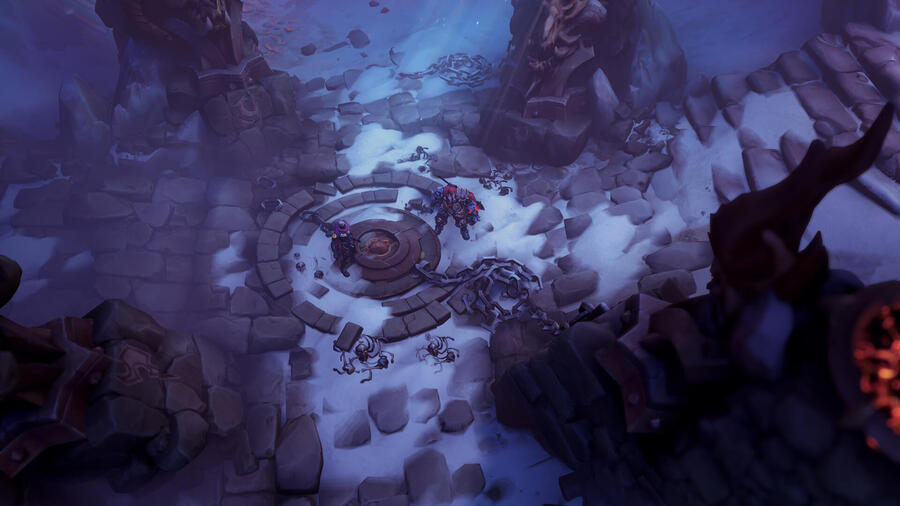
Outside of the Darksiders series itself, what influences did you look to when it came time to craft the score for Genesis?
This is probably a good spot to bring up the Bulgarian vocals! Vocals are quite a prominent feature in the Darksiders series, and once again they are heavily utilized here, both with soloists and a Bulgarian choir, all-female. But why this pretty specific choice for a choir? [Why, indeed? - Ed] Bulgarian folk singing uses a different technique to Western singers. They use the throat (pharynx) more to achieve resonance and create the sound, whereas Western singers use the mouth more as the resonance box. If you think about how your throat opens when you yawn, that is the physiology of what they’re doing while singing. It’s not much different from what you would do if you were screaming or calling out to someone, however, this is obviously highly controlled in the case of these singers. The end result is a much brighter, slightly harsher, and wilder sound that is obviously perfectly suited to a game in this environment.
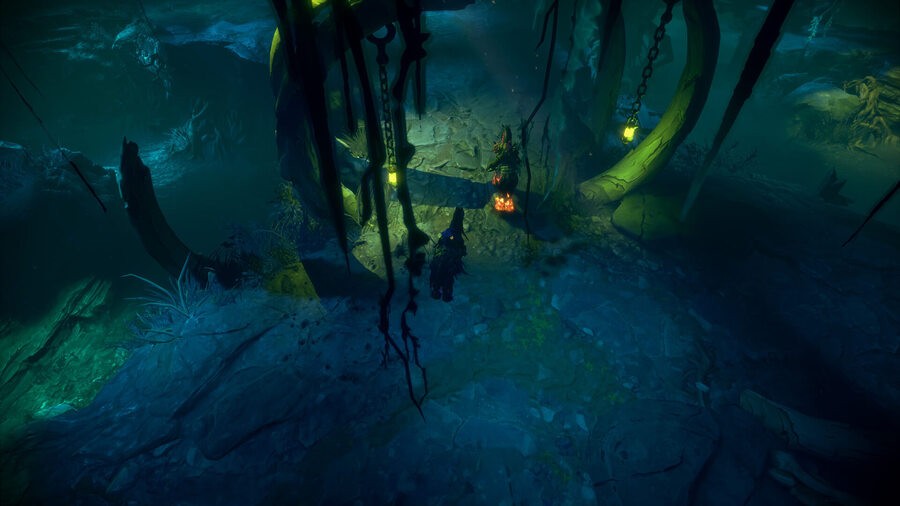
Other characteristics of this style of singing include the harmony and intervals (how notes relate to each other in a chord). One very common feature of the vocals in the soundtrack that transferred from the folk style is to have a vocal drone play underneath the main vocal line. So the first group of singers would sing the melody, wherever that might take them, and the second group would just stay on the initial note. This 1) results in interesting harmonies, but 2) staying on the same note is a classic technique to create tension, which of course is all over the soundtrack! They are all over the soundtrack, but here they are in the final boss track, Moloch.
Walk me through the genesis (hehe) of the sound for the game. Outside of that initial concept suite, how’d things develop? What’d you start with? The main theme? What brought to scoring the newest Darksiders title?
Joe Madureira contacted me out of the blue. He’d been aware of my music for a while, but what got his attention was my soundtrack for Minecraft Norse Mythology.
I’m guessing he liked the darkness of it all and also the driving nature of some of the more aggressive tracks on there. He was aware of my other work but that was what he found first. I did not have to pitch for the project (a rarity), so I guess it was a case of ‘pressure on, and you better figure it out!’ Fortunately, it did indeed, work out!
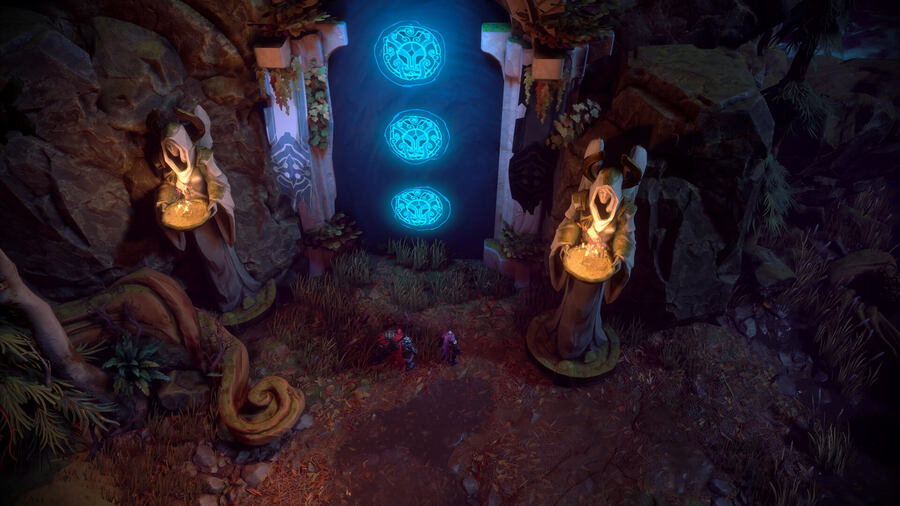
As mentioned, the first track I did was the big 9-minute concept track, but not long after that, the main theme was born. It combined several of the elements I wanted to capture aesthetically as well as the overall tone/vibe of the score. Even though the main theme that plays in the menu is one of the less aggressive tracks in the game, it still contains all the elements, be it the string riffs, electronics, Bulgarian voices, solo voices, or otherwise.
Any pieces that took an especially long time to get where you wanted them? Maybe the sound just wasn’t coalescing quite how you wanted. What finally got it to click?
In forging the sound for Darksiders Genesis, it became clear early on there’d be a heavy emphasis on stringed instruments. Not just strings but also various plucked instruments, guitars, and in particular, solo bowed instruments. I used cellist Cremaine Booker to play several of the riffs and lower melodic lines in the soundtrack. Cello can sound quite gnarly when played in a certain way and Cremaine really was able to capture the spirit of that. Cremaine’s highlight from my point of view though is in Belial, which I can only describe as cinematic dubstep with a demonic element. This is absolutely something I was not sure would work at all, but this is the only track like this in the game and is a one-off because it’s a boss fight against a giant fat demon in a chamber filled with a green acidic liquid. Cremaine’s highlight starts at around 1:55 of the track, but I’d say that this is the most ‘out there’ track on the soundtrack. There was nothing in particular that made it click, it just needed a lot of work to sound as polished as possible before I submitted it, because I didn’t want them to think I’d gone nuts!
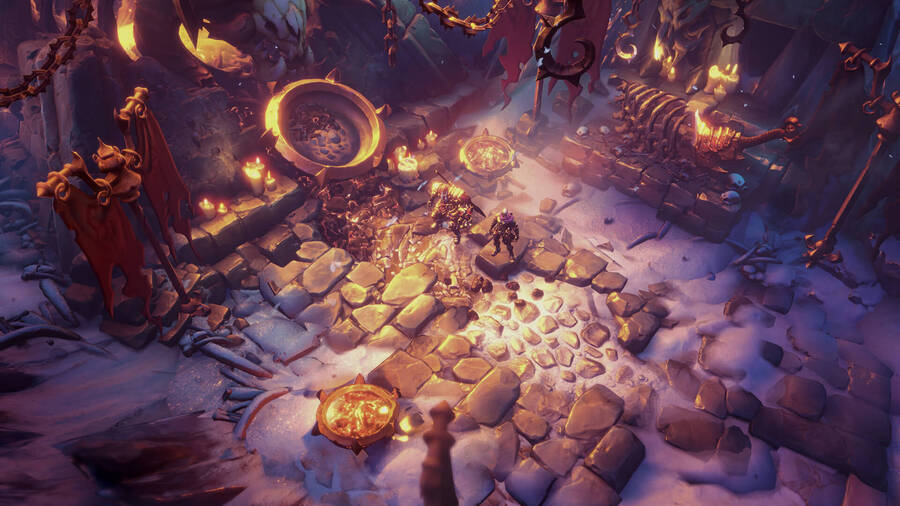
Any unexpected things that occurred while scoring the game that you can recall? There must have been some bumps in the road right?
In terms of the creative process, it was actually fairly painless thanks to Airship Syndicate’s clarity and organization, and simply knowing what they wanted. But speaking of organization, the main challenge was the ongoing logistics. Recording vocals in Bulgaria. Recording orchestra a few days later in Nashville. Recording soloists remotely. Managing it all together and keeping things organized and being amenable to any changes/revisions from Airship Syndicate. And finding time to do all this while thinking about the game’s overall flow, including cutscenes and how things feel from start to finish. I think - understandably - that a lot of people just think the music magically appears from our heads to the final product. But in many cases, it can be almost a military operation to bring a score to life. With so many disparate elements in the soundtrack, if you’re not organized it can be a nightmare to bring together.
I also have some amazing outtakes from one of the solo violinists who, whenever she did a take that she wasn’t satisfied with unleashed a tornado of scathing one-liners at herself!
Is there anything that didn’t come out quite how you were planning it that ultimately wound up being the better for it? And the inverse of that, anything that came out exactly as you had envisioned it? Any sounds you experimented with, that didn’t work quite in the way you had hoped? Any that worked better than you were expecting them to?
Any composer tries out a plethora of things when creating a soundtrack, but there’s one part I’d like to focus on. There is one character in the game - Astarte - that is a corrupted angel. We wanted the music to mirror this fact so inevitably it needed a mix of light and dark. The question was where the light part would come from, especially in a game so dark. I eventually decided to go the ‘angelic voice’ route to represent this and then every other element in the track would be much more aggressive and driving. I used vocalist Kelsey Mira. She’s a vocalist who I’ve started working with in the last year and a half. She has a brilliant non-vibrato tone, supreme control, and has a great vocal range. You can hear her in this track, first in the intro sequence, and then the boss fight itself.
I wasn’t sure if something so pure would work, but it ended up blending well with the other elements, and also, a bit like Belial, it’s the only track on the soundtrack like this so it never overstayed its welcome.
Last but not least, as my go-to closing question for first time interviews, I always like to ask about what brought you to the medium. How’d you wind up in games? Was it somewhere you always wanted to end up? Or was it more happenstance?
I’ve been gaming for as long as I can remember. My first computer was the ZX Spectrum. I remember the days of loading cassettes into computers and waiting ages for them to load! My father gave me textbooks to follow to type in code for a game in Sinclair BASIC which not only taught me how to type but also allowed me to game from an early age while learning it. Later on, I’d end up playing a lot of games with my family and I think as a result it’s something I’ve always wanted to do. I’ve always had an affinity for games as it’s the medium I feel I understand the best, but it’s the enjoyment that I felt both as a kid, and still as an adult, and being able to share those with others. I now have the privilege to be part of teams that try to help create those moments for players, it’s hard, thrilling, and enjoyable, and that’s what I want to continue doing!
And there you have it, folks! We'd, of course, like to thank Gareth both for his time and for his work on the soundtrack, which is really great! You can snag the soundtrack as a pack-in with many digital versions of the game, but it's unfortunately not available on its own at the time of writing, however you can check out Gareth's score on his SoundCloud in the meantime!





Comments 2
If Mozart were alive, would he be writing video game music?
Cool article. With the interview and putting this article together. I liked it a lot. And, it shined a light on an impressive, instrumental aspect of the gaming experience—the music—and the artist is really talented...wow!
As an aside, I’d love to hear a music score for a game in this vein that eschews the strings and woodwinds in favor of big brass and percussion. The result would be something along the lines of Basil Poledouris’s Conan the Barbarian score (though even his score had too many strings imo).
@jgrangervikings1 Oh man that Conan score is one I haven't thought about in a lonngggg time haha. I kinda go listen to it now!
Leave A Comment
Hold on there, you need to login to post a comment...